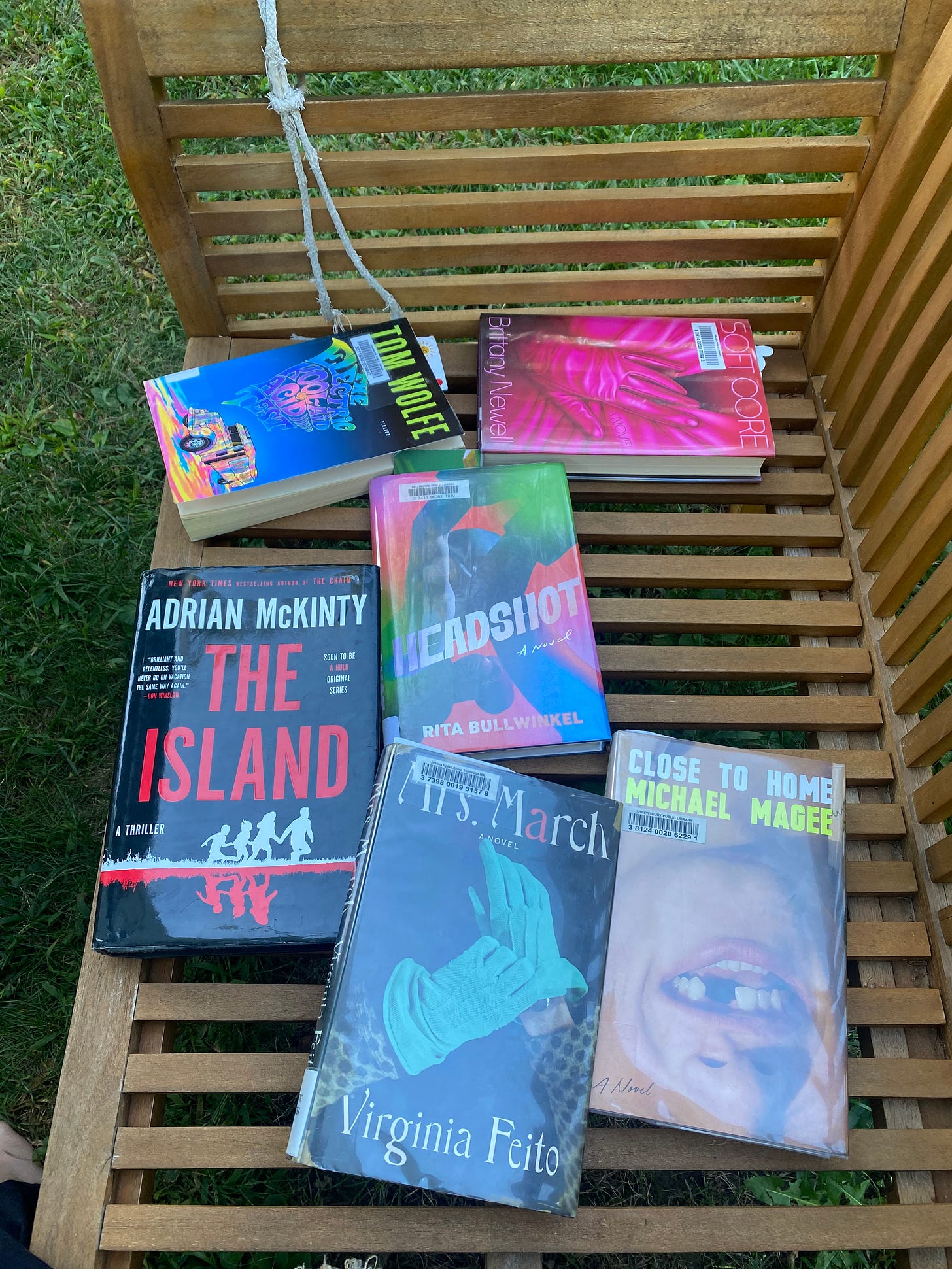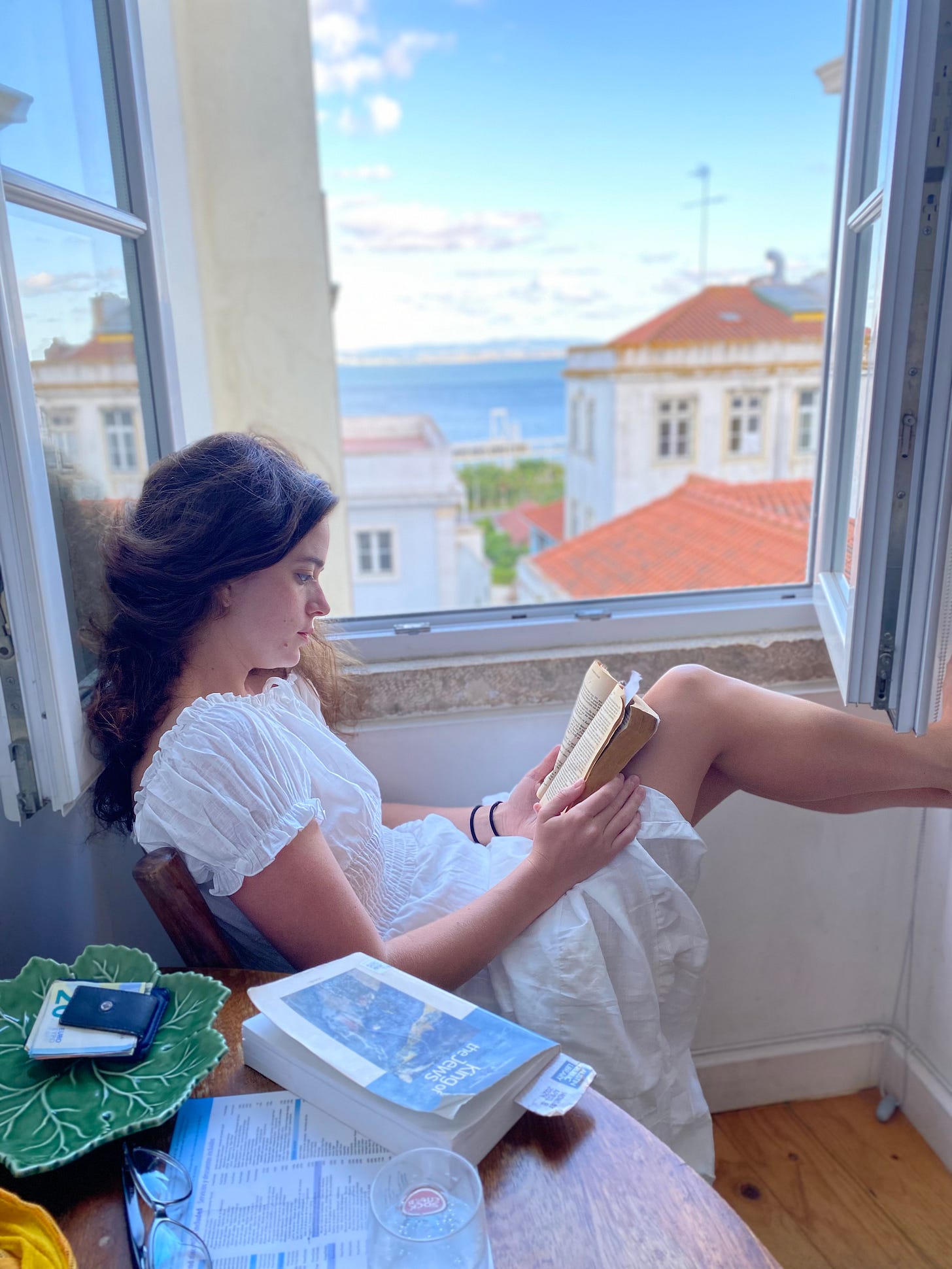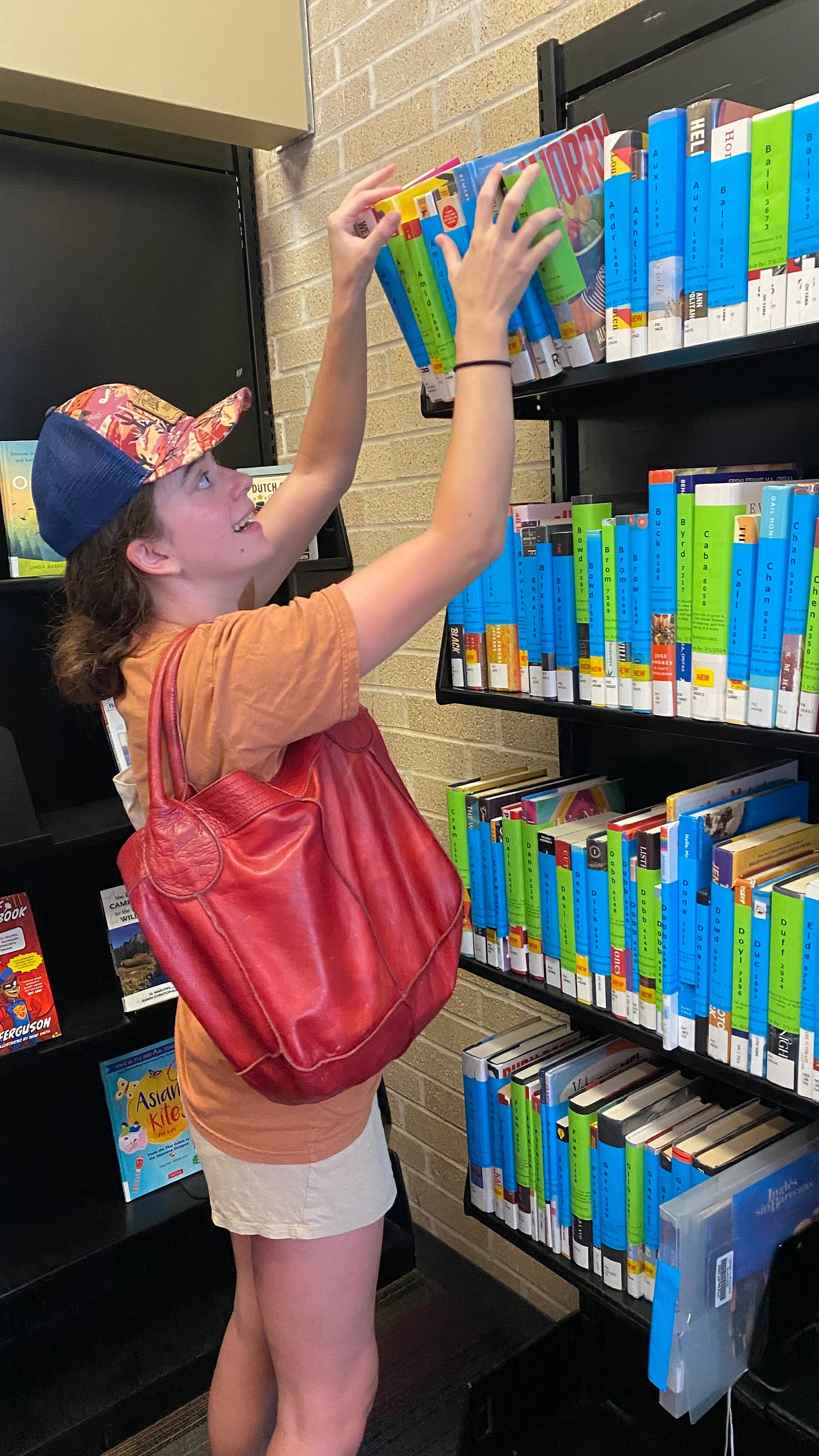How to Read
I hear it all the time. From smart, curious people. “I don’t have time to read,” they say. “I don’t have the attention span anymore.” “I would love to start reading again. There just aren’t any good books out there these days!”
As a professional reader (no, I don’t get paid to read, yes, I read like it’s my job), I am here to tell you that, if you hold any of the above beliefs, you are wrong. You do have the time. You do have the attention span. And there are literally thousands of books out there that you will love so deeply, you’ll start to wonder if they were written just for you.
If you are one of those people who wishes they read more, I have a fool-proof guide for you. And if you’re not one of those people, ask yourself why. Reading isn’t for boring eggheads. It isn’t a chore. It’s for everyone. It’s life-enriching in every sense.
To be sure, realizing this is an uphill battle, and if you have an overall negative outlook on reading, you’re not a philistine. Far from it. We are all born with an innate love of stories. But nothing kills a pure and innocent human’s capacity for curiosity and imagination quite like making them read The Scarlet Letter when they’re fourteen.
The good news is that you can rediscover that love, and your life will be richer because of it. Follow these simple rules, and see if you aren’t transformed. Just a tiny bit.
Rule #1: Don’t “get back into reading” with Finnegan’s Wake.
It’s 2025. Your New Year’s resolution was to start reading again, so you picked up something by James Joyce. Or something by Tolstoy. Or, gasp, something by Proust. You, my friend, are setting yourself up to fail. You heard me. Now, I’m gonna need you to put down that copy of Ulysses. Slowly, so nobody gets hurt.
Getting back into reading with a dusty classic is a surefire way to not get back into reading. You’ll go to that New Year’s party, and people will ask you what you’re reading, and you’ll say, proudly, maybe even smugly, “Book One of In Search of Lost Time.” And then you’ll go to a Fourth of July party, and people will ask you what you’re reading, and you’ll mumble, “Book One of In Search of Lost Time,” and they’ll say, “Weren’t you reading that in January?” and you'll say, “You must be confusing me with somebody else,” and then you’ll go to the bathroom and weep, barely recognizing your own reflection, and you’ll realize the only time you lost were the hours when you could have been reading Presumed Innocent instead
The classics are good, many of them great, but they’re not going anywhere. They can wait. Ease back into reading with a book you will actually read. Read a love story set on a made-up planet with a stupid name. Read a horror novel about machete-wielding clowns. Read a memoir by somebody who narrowly escaped a sex cult. Read what you want to read. Not what you think you should.
Rule #2: Join a book club.
No, not the Master and Margarita bookclub that the Modernist lecturer at your university is running (looking at you, BU students). Start a bookclub with your family. Your coworkers, if you can stand them. Your group-chat. Your old sorority sisters.
I’m in two. One with my family (we’re reading The Electric Kool-Aid Acid Test), and another with some friends from my BU cohort (we're reading Headshot by Rita Bullwinkel). If you can’t find anyone in your social life to read books with, look elsewhere. Join one of those online bookclubs run by hot models, where they read stuff like Just Kids and Breasts and Eggs. Better yet, go out into the community! Bookstores, churches, libraries. Indeed, my boyfriend recently joined a book club at the local library: every month he gets together with some delightful Austin weirdos and talks about a graphic novel he never would have read otherwise.
Book-clubbing holds you accountable (there’s nothing more loserish than not attending the monthly meet-up because you couldn’t do the damn reading). It’s also a social activity. It’s an excuse to get drinks with your friends (last year I was in a book club with some lovely Austin ladies. We talked about The Virgin Suicides over a cheese board and rosé and it was, frankly, aesthetic as fuck). It’s an excuse to feel like you’re a part of something— a shared knowledge of a book that you’ve loved or, at worst, powered through, as a group. Best of all, if you pick the right book, you can get heated over it and debate and possibly even fight and maybe even ruin some friendships irrevocably (but in a fun and cultured way— Didion and Babitz in a writing salon, if you will).
Simply put, reading does not need to be a solitary activity. Reading can be a party. It can be a late night conversation. It can involve rosé. Stinky French cheeses. Vicious arguments. Inside jokes that will carry the group chat for months. (My BU friends and I read White Noise in the early summer, and we respond to almost every life update now with: “This is not Babette.” IYKYK.)
Rule #3: Bring a book everywhere you go.
Yeah. Everywhere.
I was looking at the running list of books I’ve read this year, and each title conjures a specific spatial memory. I read most of Less Than Zero on a train to Belfast. I read the last chapter of The Road while standing in line at the BU employment office, waiting to turn my forms in (yes, I cried in line, whatever). I read most of The Unworthy by Agustina Bazterrica on the treadmill. I read the beginning of Rejection by Tony Tulathimutte while waiting for my friend who was late for coffee. There are moments when you can anticipate needing a book (plane rides, your niece’s interminable jazz recital), and moments when you will be grateful that you keep a paperback in your handbag at all times. Long bathroom line? Whip out that copy of Either/Or (the Batuman, NOT the Kierkegaard [see Rule #1]). At the dentist’s office, waiting to go in for your root canal? Thank God you brought Salem’s Lot to calm you down. Shredding your thighs on the elliptical? Now is the moment for The Piano Teacher to shine. Boring first date? Crack open your copy of I’m Thinking of Ending Things. They’ll get the message.
If you don’t trust me on this, then take it from the master. Stephen King said, “Reading is the creative center of a writer’s life. I take a book with me everywhere I go, and find there are all sorts of opportunities to dip in. The trick is to teach yourself to read in small sips as well as in long swallows. Waiting rooms were made for books— of course! But so are theater lobbies before the show, long and boring checkout lines, and everyone’s favorite, the john.”
Seriously. People think they don't have time to read because they look at their schedule and don’t see an hour during which they can sit with a cup of Oolong tea and a perfect ambient chill beatz playlist and read, uninterrupted. But that’s a mistake, that’s not what reading is for. As Stephen King also said, “Books are a uniquely portable magic.” Reading is for the rush hour train ride home from work. Reading is for those times when you arrive at dinner early. Reading is about getting so absorbed in your book during your pedicure that you don’t realize until much too late that your toes are sparkly and gold when you asked for a demure, Millennial pink.
Rule #4: Bath time!
Okay, you’re gonna have to hear me out, because this is controversial. But, if you know me, you know I’m a bath girl, and YOU CAN BE TOO. Seriously, not to wave my Union Jack around, but Americans are so, uh, puritanical (sorry!) about baths. If you think STANDING in a shower and letting water superficially pour down onto your skin gets you cleaner than soaking for— okay, you know what? I’m not here to extol the virtues of the bath (I’ll save this for its own dedicated Substack). I’m here to extol the virtues of reading in the bath.
If you know me, you also know that, not only do I love a bath, but I love a bath read. A bath read is a flawless mechanism for enjoying the fruits of literary indulgence. But you need to do it right.
Step one: Leave your phone in the other room. An easily accessible phone kills the bath-read experience. You need to be trapped in the warmth of the bath with nothing but your book(s) to keep you company.
Step two: Have a towel nearby. You need to be able to wipe your hands so that you’re not getting the books too wet. (But a little wet is okay. Books are not ornaments, people. They’re made to be used! They want to live! And, before you come for me, I have never once been charged a water damage fee by a library. So, there.)
Step three: Buy a bath tray. You can rest your book against it as you read. You can also use it as a resting place for a candle, various oils and scrubs, and also your three beverages (I recommend a coffee, a water, and a sweet drink).
Step four: Relax and enjoy. The point of the bath-read is to set aside a time that is sacred, peaceful, and devoid of distractions. Plunge in to a bath and plunge in to a book. I dare you to try it, just once, and not be converted.
Rule #5: Give up on books like it’s your job.
I know. Another controversial take. But, take it from me: if you stick with every book you read, reading is going to become something that you dread. It will be a chore.
There are a lot of books in the world. Like, a lot. It’s okay to admit that a good chunk of them will not be for you. When the New York Times (garbage) readers’ choice list of “Best Books of the 21st Century” came out, I found myself laughing at how many of the books on that list I had abandoned. More than I had finished, to be sure. A Little Life? DNF one-hundred pages in. The Corrections? DNF fifty pages in. Demon Copperhead? DNF after the first line. “First, I got myself born”??? Check, please…
The point is, you are not a failure for giving up on a book because you don't like it. Nor are you a hero for powering through a book you hate. Yes, we should challenge ourselves, but there’s a difference between struggling through a complex yet rewarding novel, and forcing yourself to read Barbara Kingsolver’s pretentious drivel just because it was on some list and won a Pulitzer (Pulitzer Shmulitzer, my wise mentor once said). Sorry, Babs!
Rule #6: Join your library.
The amount of times I’ve suggested a book to someone and they’ve said something along the lines of “just bought it on Amazon” is mind-boggling. Yes, it's good to buy books, but if every time you think you might want to read a book you’re making a financial commitment? Well, that’s a great way to talk yourself out of reading a book you think there’s even a chance you might not like. When the stakes are lower, you can experiment. In my most recent library haul, for instance, I picked up a scientific tome about prion diseases, an Icelandic novel from 1934 that my BU professors used to rave about, and a Vietnam War vampire thriller. These were books I would never have committed to buying, but I didn’t have to. In this way, and in many ways, libraries expand our worlds.
Simply put, libraries are an incredibly precious resource. Support up-and-coming authors by buying their books, please, but support your local library just as hard. I’ve written about libraries before, how much I utterly adore them. From the events to the staff suggestions to the seed library (which, I'll have you know, I have successfully grown TWO Mexican Buckeye saplings from), the library— whether it’s the Austin library or the Sturbridge library or the Boston library— is precious to me, and it can be precious to you, too. It’s such a comfort to know that, at least for now, there will be a library everywhere I go. Take this as a sign to go to your local library and look around. Challenge yourself to pick up one unfamiliar title off the shelves.
Rule #7. Have multiple books going at once.
My general guideline is to have one fun book, one dense book, and one non-fiction book going simultaneously. That's the bare minimum. I usually have more. Here are all the books I’m reading as I write this, for reference…
The reason it’s vital to be working on many books in one go is so that you will never have a chance to break out the old: “I would read, but I’m not in the mood for the book I’m working on right now.” The antidote to not being in the mood for the historical thriller you’re reading is to have a literary romance handy on your bedside table. Home alone and don’t want to get nightmares from your Australian Outback slasher novel? Turn to that funny, druggy memoir instead! Love the dark academia novel you’re working on, but need a break from those toxic Classics kiddos? Good thing you have that courtroom page-turner on your coffee table!
Reading is, ultimately, a habit. And, without momentum, it’s impossible for a habit to become, well, a habit. Do whatever you can to keep the momentum going.
8. Join Goodreads (or StoryGraph, or Bookly)
I’m on Goodreads, and it’s not perfect (the fact there are no half-star rating options is a crime), but it makes logging my reads fun, and it’s a great way to keep track of what I’m reading, as well as my thoughts on a certain book. I’m able to join popular challenges, like the 52 book challenge, which I'm currently slaying, and connect with friends, see what they’re reading.
Best of all, Goodreads, imperfect as it is, provides a map. It tells a story. It allows me to look back on all I’ve read and think about my life through books. It shows me what I read when I was working on my thesis— a thriller about mind control and, inexplicably, a non-fiction account of the Great Hinckley Firestorm of 1894. What I read in North Carolina with my family in July— The Lobster by Guillaume Lescable and Sky Daddy by Kate Folk, two wildly different yet eerily similar books. It lets me remember the first book I read after my mentor died— Green Dot, by Madeleine Gray, a book he would have loved, despite himself. The months I read the most. The months I read the least. The month I was super into memoirs about women with rare illnesses who loved horses. The month I read three dystopian feminist novellas by Latin American authors. When you read a lot, you get to experience the singular joy of perceiving your life as a story of books, a giant novel made up of novels, where every book you read is its own chapter. Reading captures precious sensory moments: The smell of sesame oil will forever remind me of The Coin, because I read most of that novel while eating Korean food across the street from my place. The sound of Erik Satie will always remind me of Chemistry by Weike Wang, because that’s what I listened to during my first night alone in my Boston studio apartment. I lit a lemon verbana candle and read this short novel by Wang, who would go on to replace my mentor after he died. I didn’t know that at the time, of course. I was just reading a funny book in my very own slice of Boston, Gymnopédie no.1 playing on my new Alexa. I would put the book down every once in a while to look out my window at the train whipping by. Feeling the slight weight of the slim book against my thigh, I would marvel at the strange and wonderful places my life had taken me.
If you’ve read this far, I have a proposal. Venmo me one dollar and describe your dream book to me. I will give you a suggestion. Satisfaction guaranteed or your money back. @Celeste-Amidon
xoxo. Happy reading!




